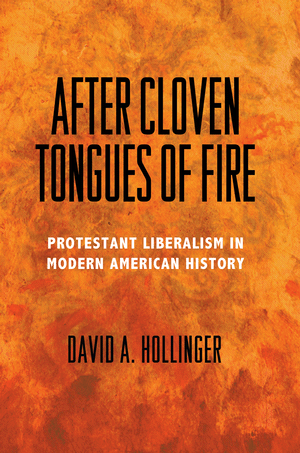Friends,
For this week’s Contact entry, I would like to introduce you to a book I currently am reading, After Cloven Tongues of Fire: Protestant Liberalism in Modern American History (Princeton: Princeton University Press, 2013), by David Hollinger, a now-retired, former chair of the history department at UC Berkeley. The book studies the impact progressive Protestantism has had in the  shaping of American history.
shaping of American history.
I am finding the book to be hopeful. For as long as I have been a pastor, I’ve mostly heard bad news about the state of mainline Protestantism. Our numbers are dwindling, our influence is waning, especially when compared to our Evangelical sisters and brothers, the wind is out of our sails. This is the narrative that has hung over my ministry for nearly 24 years as a pastor, and I’ve never considered questioning it until I started reading Hollinger’s book.
David Hollinger does not dispute the numerical decline of progressive Protestant congregations and institution, rather he points out that despite dwindling numbers, progressive Protestantism has helped to establish much of what is good in the United States Today.
For example, despite being in a position of cultural prominence, historically we have advocated—and sometimes agitated—for a society in which Roman Catholics and Jews would be seen as equal to Protestants, we championed the Civil Rights movement, we have opposed every war since the Second World War, we embraced science, we supported feminism, and, more recently, we came out in favor of marriage equality.
We weren’t the only folks in American life who held such positions, but it wasn’t so long ago that nearly every person in a position of power and influence in the United States self-identified as some kind of mainline Protestant. Now there isn’t a single Protestant on the Supreme Court (that will change should Neil Gorsuch be confirmed, but even he was raised Catholic and converted to the Episcopal church when he married his English wife). The United States has a strong anti-war community, and scientists’ voices are being heard in the halls of power (at least some of the time). The United States has elected an African American President, and we’ve had three female secretaries of state, including Hillary Clinton who won the popular vote in the last Presidential election. Marriage equality is the law of the land. A lot of good has happened in our society, and progressive Protestantism—like what we practice at Montclair Presbyterian Church—has contributed to those changes.
Now, David Hollinger wrote his book before the Election of Donald Trump, and the next time I see him (his daughter and daughter-in-law and their children are dear friends of the Daniel family) I’ll ask him how the ascendancy of the house of Trump might modify his opinions, but of this much I am confident (thanks to David Hollinger): progressive mainline Protestants have done good work throughout American history. We’re not finished—not by a long shot—and our success in the past can inspire us with faithfulness and with confidence born of the knowledge that our voice remains strong and our contributions are needed as we live into whatever future is in store for us.
God’s Peace,
Ben
